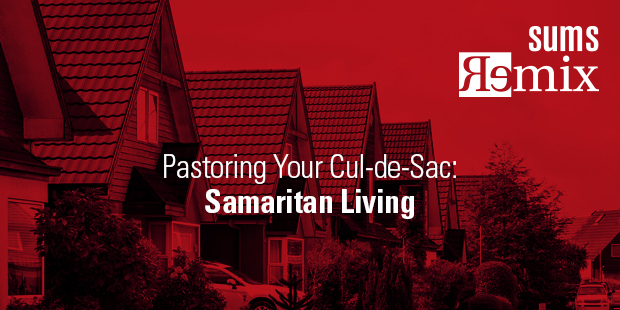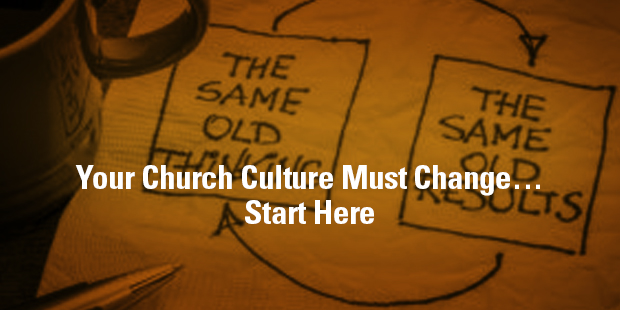
Pastoring Your Cul-de-Sac: Samaritan Living
Author Reggie McNeal invites us to get off our ass (biblically speaking) with a focus on the Parable of the Good Samaritan:
25 On one occasion an expert in the law stood up to test Jesus. “Teacher,” he asked, “what must I do to inherit eternal life?”
26 “What is written in the Law?” he replied. “How do you read it?”
27 He answered, “‘Love the Lord your God with all your heart and with all your soul and with all your strength and with all your mind’; and, ‘Love your neighbor as yourself.’”
28 “You have answered correctly,” Jesus replied. “Do this and you will live.”
29 But he wanted to justify himself, so he asked Jesus, “And who is my neighbor?”
30 In reply Jesus said: “A man was going down from Jerusalem to Jericho, when he was attacked by robbers. They stripped him of his clothes, beat him and went away, leaving him half dead. 31 A priest happened to be going down the same road, and when he saw the man, he passed by on the other side. 32 So too, a Levite, when he came to the place and saw him, passed by on the other side.33 But a Samaritan, as he traveled, came where the man was; and when he saw him, he took pity on him. 34 He went to him and bandaged his wounds, pouring on oil and wine. Then he put the man on his own donkey, brought him to an inn and took care of him. 35 The next day he took out two denarii and gave them to the innkeeper. ‘Look after him,’ he said, ‘and when I return, I will reimburse you for any extra expense you may have.’
36 “Which of these three do you think was a neighbor to the man who fell into the hands of robbers?”
37 The expert in the law replied, “The one who had mercy on him.”
Jesus told him, “Go and do likewise.”
Luke 10:25-37 (NIV)
We’re living in a bizarre polarity of unprecedented connectedness and unparalleled isolation.
When we finally get home, joining countless others in our cul-de-sacs or subdivision streets, we want to be home.
The Great Commission may carry you to the ends of the world, but it starts on your street. God has given us a perfect environment for demonstrating the gospel and advancing His mission, if only we would open our eyes to it. It’s that place you probably consider your personal and private fortress – your home. Hospitality is one of the simplest – and most exciting – ways to engage in God’s mission.
If we are ever going to join all our lives to God’s mission to change the world, we need to reclaim all of our ordinary pieces as a part of that gospel mission. We have to reject the notion that something has to be big or unusual to be significant. We will have to view the ordinariness of our lives as significant, and allow God to use our homes as a seed to be planted and grown, not something to be discarded or devalued.
We need to practice neighboring.
Just who is our neighbor? And, how can we serve our neighbors?
SOLUTION #1: Practice the three actions of the Good Samaritan
THE QUICK SUMMARY
There was a time when neighbors knew each other’s names, when small children and the old and infirm alike had more than their families looking out for them. There was a time when our neighborhoods were our closest communities.
No more. Neighborhoods have become the place where nobody knows your name. Into this neighborhood crisis the words of Jesus still ring true: Second only to the command to love God is the command to “love your neighbor as yourself.”
In Next Door as It Is in Heaven, Lance Ford and Brad Brisco offer first principles and best practices to make our neighborhoods into places where compassion and care are once again part of the culture, where good news is once again more than words, and where the love of God can be once again rooted and established.
A SIMPLE SOLUTION
After the attention-getting quote by Reggie McNeal noted above, he continues:
“I don’t know what business you are in (education, the social sector, for-profit enterprise, health care, etc.), but ultimately you want to be in the people business. Helping people is the best part of life! If you don’t discover this truth and act on it, not only will your “neighbors’’ needs go unmet, but you will never be whole.”
The Parable of the Good Samaritan is a call to action, not just a great story.
If anyone should “neighbor” differently, it should be us. So let’s do it. Let us love our neighborhoods as ourselves.
As followers of Jesus, we can’t afford to miss the point in the parable usually named “The Good Samaritan.” We believe we would better understand Jesus’ point if, we called it “the parable of the good neighbor.” The Samaritan – the one who proved to be a real neighbor – demonstrates several important traits we can learn from.
Nearing – All three of the players in Jesus’ story “saw” the man who was in distress. All three of the guys were busy. They were on a journey. They had things to do, people to see. But there was a difference in the three. Two people saw and went on. One person saw and went to.
It’s so much easier to just “pass over to the other side.” What we thought we saw or heard may not be the case. It could just be our imagination. That conversation I overheard between one of my kids and her playmate from down the street may have sounded like her family is struggling with finances, but I may have misunderstood. Then again, little Carly does seem to eagerly accept every offer for a chance or to stay for dinner.
I will never know the answer unless, like the Good Samaritan, I go to the person.
Caring – The real neighbor in Jesus’ story begins to attend to the wounds he discovers. Not only does he offer his own immediate resources, he seeks the assistance of others nearby. The Samaritan needed to continue his journey. But he didn’t just leave the man behind. He asked the innkeeper to take care of the fallen man.
Think about that. Our aim must be higher than just to be a good neighbor ourselves. The goal is to create a neighborhood of good neighbors whereby our collective gifts, talents, resources, and caring heart of many neighbors join forces when needs arise.
Sharing – Finally, look back and see what this neighboring example set in motion. Before we get the parable of the real neighbor, we get the great commandment: “You shall love the Lord your God with all your heart and with all your soul and with all your strength and with all your mind.” Heart. Soul. Strength. Mind.
Jesus is talking about our passion and being. What do you care deeply about? What do you love to do? What are you skilled at and knowledgeable about? Jesus says, “Love God with all of that!” And then he says, “Make it tangible by loving your neighbor as yourself.”
Lance Ford and Brad Brisco, Next Door as it is in Heaven
A NEXT STEP
For our friends, it’s easy for us to share what we have and know. But Jesus takes it to an entirely different level. He defines real neighbors as those who are willing to do so with strangers – and not just strangers because they’ve never met.
Authors Lance Ford and Brad Brisco provide some ideas for reflection and preparation in practicing the three actions of the Good Samaritan as noted above. Set aside some quiet time this week and follow the suggestions below.
- Immerse. Slowly read the parable of the Good Samaritan in Luke 10 from at least five different Bible versions in order to hear differences in translations.
- Recognize your resources. Reflect on your own heart, soul, strength, and mind. Make a list of what you know and what you possess. What are you passionate about? Begin making a list that will help you to serve others and provide an example for your neighbors as they consider their own resources.
- Consider others. Think about your neighbors. Who might be interested in joining you in making your neighborhood the best it has ever been?
- Pray. Begin praying for your neighborhood each day, that it becomes a place that experiences the peace and blessings of the Lord and the revelation of the gospel of the kingdom of heaven.
Excerpt taken from SUMS Remix 88-1, released March 2018.
This is part of a weekly series posting excerpts from one of the most innovative content sources in the church world: SUMS Remix book excerpts for church leaders.
SUMS Remix takes a practical problem in the church and looks at it with three solutions; each solution is taken from a different book. Additionally, a practical action step is included with each solution.
As a church leader you get to scan relevant books based on practical tools and solutions to real ministry problems, not just by the cover of the book. Each post will have the edition number which shows the year and what number it is in the overall sequence. (SUMS Remix provides 26 issues per year, delivered every other week to your inbox).
>> Subscribe to SUMS Remix <<
>> Purchase prior issues of SUMS Remix<<

Tags: Brad Brisco, Lance Ford, Next Door as in Heaven, SUMS Remix

















